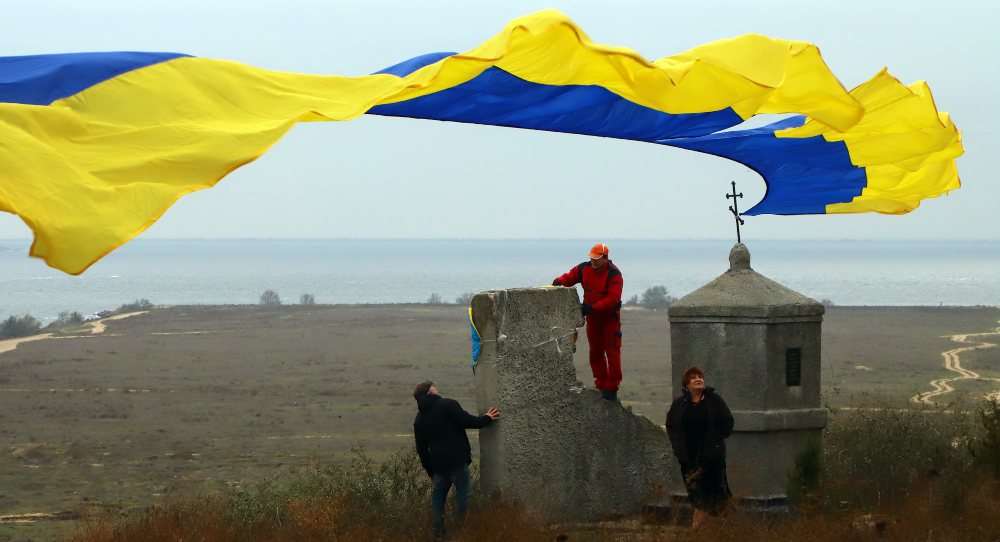Six years after the Russian invasion of Ukraine, three recent and unexpected events have reminded us what really is at stake in the several “frozen conflicts” that Moscow is skillfully choreographing.
First, the election in April 2019 of an unorthodox, promising new president, Volodymyr Zelenskiy, has reinvigorated Ukraine’s hopes for a Western, democratic future.
Second, Zelenskiy was hardly in office before an extortion attempt by the U.S. president, Donald Trump, pushed Ukraine to the center of a political drama, which is not yet over.
And third, changes in January 2020 in the government officials managing Russia’s Ukraine strategy has offered slivers of hope of flexibility from Moscow.
In all three cases, pressure on the EU to act in its neighborhood is much higher than is at first evident. Countries such as Armenia, Azerbaijan, Georgia, Moldova, and Ukraine—which all have so-called frozen conflicts on their territories, most of which Moscow is helping sustain—are not far-away countries of little relevance. They are on the front line. They are key building blocks of a democratic and secure Europe. At stake is not merely Europe’s desire for a tidy “neighborhood,” but rather the future of a “Europe whole and free.”
Failure to act will suggest to Russian President Vladimir Putin that he has both the United States and the EU in his pocket.
Agreement on ending the war in Ukraine’s eastern Donbas region will be difficult. Putin values conflicts in Ukraine and elsewhere as relatively low-cost tools to support Russia’s deeply felt need to subjugate its former Soviet neighbors.
He and his clique understand the dangers that freedom in former Soviet republics presents for their continuing control. That is why they will continue to fight hard to undermine their democratic spirit. And that is why they are tearing at Europe’s confidence and unity and playing to Trump’s ego.
Regrettably, Europe played little or no role in the recent events, and its strategy for the Eastern neighborhood is moribund. The lethargic December 2019 meeting in Paris of the so-called Normandy Four—the leaders of France, Germany, Russia, and Ukraine—made clear that Europe has no influence on the calculations of either Trump or Putin.
The Normandy format emerged five years ago after former U.S. president Barack Obama exhibited Trump-like disinterest in the Russian annexation of Crimea and in its invasion of eastern Ukraine.
Like many other diplomatic efforts of the past three decades in this region, the Normandy format’s 2015 Minsk II agreement was doomed to failure from the start. It is little more than a list of ideas that could perhaps lead to some sort of peace process.
Even worse, rather than being branded as the aggressor, Russia was granted a privileged position as one of the peacekeepers. Putin enjoys the cover provided by the Minsk agreements. He (with Obama’s support) was the clear winner of round one.
Zelenskiy’s arrival (in elections certified by the OSCE) ushered in round two. His election was all the proof we should have needed for Ukraine’s democratic fervor. But his herculean task was made more difficult by Trump’s blackmail and by French President Emmanuel Macron’s bizarre suggestion after the G7 summit in August 2019 that France was “a non-aligned country with allies.”
Even so, the December meeting in Paris was notable. By standing firm against the three Normandy potentates, Zelenskiy clearly won round two. Now there can be real hope for Ukrainian democracy.
Zelenskiy’s success might push round three forward. A deal may be possible. Under pressure at home to end the war, his success in Paris could give Zelenskiy confidence to seek a deal. Putin’s recent political maneuvers, which included sacking his main Ukraine adviser, suggests the Russian president may feel some urgency as well.
And after revelations of his attempts to blackmail the Ukrainian president, Trump now has no option other than to expand American support for a country that his own secretary of state, Mike Pompeo, claims Americans cannot even find on a map.
But Russia’s fixation with control is endemic. It much predates enlargement of NATO and the EU. As is evident in the Balkans and the Caucasus, where such deep-seated enmities are involved, trade concessions such as Nord Stream 2 or diplomatic “conflict prevention” actually add to Russian leverage.
Former Russian foreign minister Andrei Kosyrev has suggested instead to trust Russia’s civil society. He has even credited the 1975 Helsinki Final Act—which among other things boosted civil rights in Communist countries—with the collapse of the Soviet Union. Strengthening civil society in Ukraine and the Caucasus would solidify the essential Euro-Atlantic democratic space.
Those who are muffling their criticism of Moscow in the hope of achieving a comprehensive security order with Russia should recall Russian Foreign Minister Sergei Lavrov’s call at the 2017 Munich Security Conference for a “post-Western world order.” As Russian cyberwarfare dramatically demonstrates, Putin is seeking to use such an “order” to interfere even more in Western civil space.
Unfortunately, Western governments appear also not to appreciate the fundamental choices involved in Europe’s East. If, after risking everything to build democracy, Ukraine or Georgia were to fall back into the Russian orbit, the damage to the self-confidence of Western democracy, at a time of a global values competition, would be massive.
Fortunately, even the most skillful disruption cannot undermine healthy civil societies. Increased support for just and peaceful settlements in Ukraine and other countries such as Moldova and Georgia are the best way to outflank Putin’s strategy and perhaps even to lay the foundation for democratic evolution in Russia itself.
That is Europe’s challenge—and responsibility.
John C. Kornblum is a senior counsellor at Noerr LLP.








